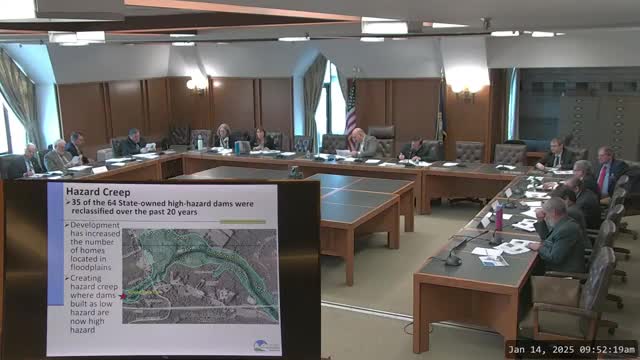Public hearing on HB 106: lawmakers hear broad testimony for and against study of climate‑damage costs
Get AI-powered insights, summaries, and transcripts
Subscribe
Summary
At a Jan. 14 public hearing, supporters urged lawmakers to form a commission under House Bill 106 to estimate the monetary cost of climate‑related damage and recommend funding options; opponents said attribution and modeling uncertainties make such a study premature or legally risky.
House Bill 106 would establish a commission to estimate the monetary cost of climate‑related damage to New Hampshire and recommend ways to recoup those costs. Committee members heard more than a dozen public comment speakers with a wide range of views.
What the bill would do. Sponsor Representative Tony Kaplan (Merrimack 8) said the commission would catalogue economic impacts, estimate adaptation and recovery costs and propose equitable funding mechanisms. “This bill establishes a commission to determine the financial cost of climate damage to New Hampshire and the best methods of recouping those costs,” Kaplan said in his opening statement.
Supporters’ arguments. Dozens of public commentators, including municipal officials, conservation advocates, a UNH student and local business owners, urged the committee to create the commission. Points they raised included rising storm repair and insurance costs, threats to agriculture and winter tourism, public‑health impacts from wildfires and particulate matter, and the need to identify funding to protect infrastructure and communities. Conservation Law Foundation attorney Nick Krakoff urged lawmakers to quantify costs to better plan and adapt. Several speakers drew an analogy to PFAS‑related recovery and argued industry accountability was appropriate.
Opposition and technical questions. Speakers opposed to the bill included former Governor Michael Sununu and several academics and engineers who said attribution of specific local damages to global fossil‑fuel emissions is scientifically and legally difficult. They argued climate models and causal links are uncertain or do not reliably tie local extreme events to anthropogenic emissions, and they warned a commission could lead to unfair cost allocation on energy suppliers and consumers. Some witnesses noted litigation in other states and urged caution.
Key themes lawmakers pressed. Committee members questioned both sides about evidence and scope: whether existing data show rising local damages; whether a state study would produce usable, defensible estimates; and what legal or financial mechanisms could fairly fund adaptation or compensation if costs are calculated. Opponents pressed for peer‑reviewed attribution science; proponents pointed to measured increases in costs for insurance, municipal repairs and lost economic activity.
Public record and next steps. The committee accepted oral testimony and recorded a large number of written comments (the electronic hearing record showed substantially more public submissions in support than opposed). No committee action or votes occurred at the hearing; sponsors and opponents left the committee with follow‑up questions and the committee will consider the bill during its working process.
Ending. Lawmakers will weigh whether a state‑level commission can produce defensible cost estimates and policy options without overreaching or shifting disproportionate burdens to consumers. The hearing highlighted a contested technical, fiscal and legal landscape that the committee must resolve if it advances HB 106.
